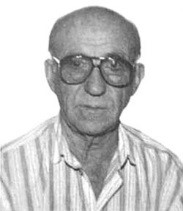
Abram Verses
Abram N. Verses was born in 1922 in Vilna, which was then part of Poland, into an affluent family – his father, Nakhman, was a shop-owner. Despite his bourgeois origins, Abram joined the underground Young Communist League (Komsomol) early on. Paradoxically, when the Soviets occupied Vilna (which was renamed Vilnius and attached to Lithuania as the country's capital) in summer 1940, they expelled Abram from the Komsomol because of his "capitalist" parentage. However, his old contacts within the Komsomol would later save his life: on June 22, 1941, the day of the German invasion of the Soviet Union, his old friends let him board a bus that was evacuating Party and Komsomol leaders from Lithuania into the Soviet rear. In this way, Abram arrived in the town of Nikolsk, approx. 750 kilometers (470 miles) southeast of Moscow, where he worked at a military factory.
In December 1941, the formation of a Lithuanian division of the Red Army was announced, and all the "Lithuanians" in Nikolsk rushed to the local recruitment office to enlist in it. In January 1942, Verses arrived in Balakhna, where the 16th Lithuanian Division was stationed, and was attached to its 156th Rifle Regiment as a private. He recalls: "Our company consisted of 150 men, and was almost completely Jewish – there were only five [ethnic] Lithuanians from Siberia and quite a few Russian boys that had been born in Lithuania."
Throughout 1942, Verses, along with the other raw recruits in the Division, underwent military training. In February 1943, the 16th Lithuanian Division had its first combat engagement, in the vicinity of Alekseievka (in the Oriol Region, southern Russia). Abram Verses participated in this poorly prepared Red Army operation for only five days, being severely wounded on the fifth. After a long stay at various hospitals, Abram was invalided from the army. He tried to enroll in Moscow University, but failed: in March 1944, he was reexamined and declared fit for military service. At the enlistment office, Verses asked not to be sent back to the Lithuanian Division; his request was satisfied, and, to his astonishment, he got a "cushy job", being assigned as a sergeant to the regiment guarding the Kremlin (and Soviet leaders) in Moscow.
In July 1944, Abram Verses learned that Vilnius had been liberated by the Red Army, and, having received an oral permission from his battalion commander, he went to his native city. In Vilnius, he learned that his entire family, parents and two siblings, had perished in the Vilnius Ghetto. As it turned out, the oral permission was not good enough: Someone denounced Verses as a "deserter" to the regiment's counter-espionage "SMERSH" unit, and he was sent to a penal company fighting on the Belorussian-Polish border. Despite this sudden "reversal of fortune", Verses recalls that he "was totally calm as he went to the front, his sole desire being to take revenge on the Germans for his family". After several days of fighting, Verses was wounded once more. Following his discharge from hospital, he received the Order of the Patriotic War, 2nd Class, and returned to his former guard unit.
In 1946, Abram Verses was discharged from the military. Then, in November 1947, he was arrested by the MGB (the predecessor of the KGB) for "contacts with Zionists" (in 1946, Abram had begun a correspondence with relatives living in the Land of Israel). During the "investigation", he was charged with being a member of a Zionist organization, and the court sentenced him to ten years in a GULAG camp. He was released in 1956, after Stalin's death. Following a brief stay in Moscow and a visit to Vilnius, Abram Verses was "repatriated" to Poland, finally arriving in Israel in February 1957.
Abram N. Verses died in 2016, and was buried at the Yarkon cemetery in Tel-Aviv.
Abram Nakhmanovich Verses is the cousin of Abram Lazarevich Verses, a renowned World War II combat pilot.






